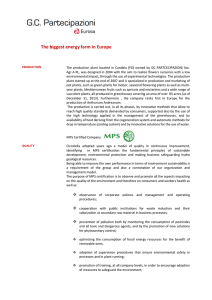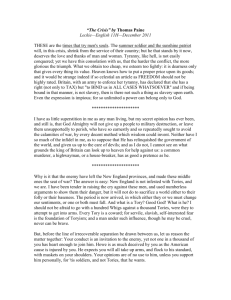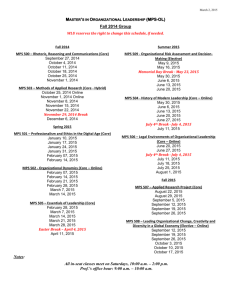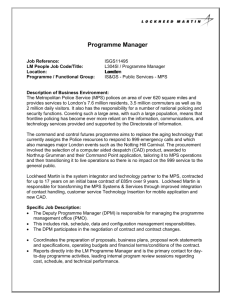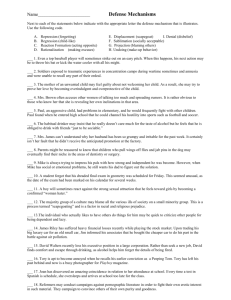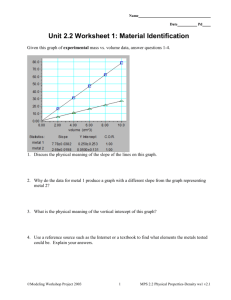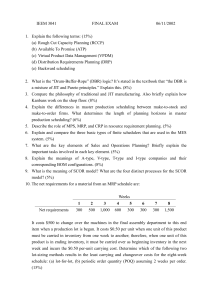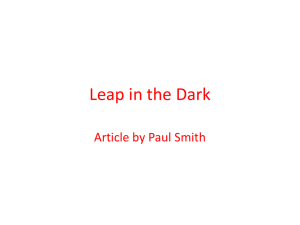Miners2Major05lect
advertisement
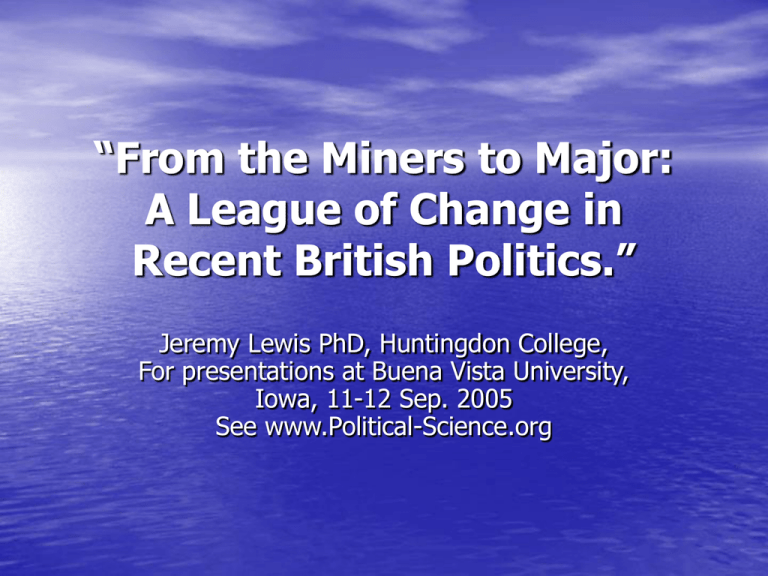
“From the Miners to Major: A League of Change in Recent British Politics.” Jeremy Lewis PhD, Huntingdon College, For presentations at Buena Vista University, Iowa, 11-12 Sep. 2005 See www.Political-Science.org John Major stereotyped as the grey man of the Tory party • • • • • • The whiz kid whose fast rise up the greasy pole culminated in a slippery slide downwards economic stagflation and low approval ratings unable to prevent bickering, scandal and policy drift echoes of Churchill’s “modest” depiction of Atlee [cartoon] Major as Mr. Underpants, the spindly superhero. PM as Mr. Underpants until, that is, Edwina Currie’s revelations in 2002. Now Sir John Major seen as • the creator of Northern Ireland peace agreement • the warrior of the 1991 Gulf War • the international statesman and peace • • negotiator the last successful Conservative party leader returned a party to the moderate “inside right” electorate Major in the context of British Politics • PMQT shows integration of legislature and executive – – – – – – – Commons culture of Oxford Union debating PM confronted by MPs articulate ministers, well informed & gladiatorial patronage power of the prime minister cabinet and shadow cabinet: loyal Opposition front bench (ministers) versus backbench (MPs) Multi-party system with cross-benchers: • First Past the Post system favors Con & Lab, disfavors Lib Dems Uncodified Constitution • doctrine of parliamentary sovereignty – no supreme court, no constitutional review • flexible terms of office and votes of no • • • • confidence cabinet’s collective responsibility: “government are” ministerial responsibility & resignation rise of PM and staff, public relations embourgeoisement: decline of class-based politics postwar welfare state consensus: • • • • • • • equality over individualism full employment over productivity “fair shares for all” “no jumping the queue” “homes fit for heroes” “Butskellism” (Butler & Gaitskell) “corporatism” (tripartite economic discussions) 1960s and 1970s, consensus declined • Labour & Conservative governments • economic deterioration • winters of discontent 1974 and 1979 • “bloody-minded” unions & “out of touch” management • Miners brought down Heath Tory government, 1974 Thatcherism revolution: • tax cuts: larger shares for some • property holding democracy: shares for all • market forces in all institutions: scramble to head the queue • Privatization of 11% of economy • Broke miner’s union 1984 • Over 20% shareholders • Council house sales • Self-budgeting universities and hospitals Public Opinion: • now more polarized • mostly favors postwar consensus (I. Crewe) • by 1990, only 17% of Tory MPs actually Thatcherite (P. Norton) Understated leader sandwiched between two prima donnas • not an Oxford Union debater • Citizen’s Charter a minor reform • Thatcher’s budget cuts, privatization, supply side revolution • Blair’s Third Way reforms John Roy Major’s early life, 1943• untypical British leader • name “Roy”not even on birth certificate • son of traveling circus performer, Tom Major-Ball • • • • • • – Late discovery of half-siblings impoverished by unemployment rejected as bus conductor made garden gnomes with brother Terry not upper middle class -- free school uniform not Eton – just grammar school not Oxford – not even university (J. Callaghan) Early Career: • Banker 1965-1979: very successful • Married Norma 1970, two children Major’s climb up the greasy pole (Disraeli) • Spring 1991, most popular PM in 30 years • Prime Minister 1990-97 • Leader of the Conservative Party 1990-97 – Over Michael (“Tarzan”) Heseltine and Douglas Hurd (diplomatic) – – first TV budget speech, TESSAs UK joined ERM, 1990 – Chief Secretary to the Treasury 1987-89 • Chancellor of the Exchequer 1989-90 • Foreign Secretary 1989 • • • • • • • • Minister of State for Social Security 1986 Under-Sec for Social Security (welfare & OAPs) 1985 Treasury Whip 1984 Assistant Whip 1983 Parliamentary Private Sec. 1981 MP for Huntingdon (1976) 1979, 1983, 1992, 1997. Lambeth borough council 1968-71, created housing Soap box speeches in Lambeth, 1964-68. Conservative party factions • Leadership elections post 1965 among MPs • 1922 Committee (revolts in private) • Thatcherite free-market insurgents (“dries”) • • • • • 17% only aristocratic High Tories declining (trad cons) “Hang ‘em and flog ‘em” brigade in shires One-Nation moderates larger group (“wets”) dropping leaders after lost elections all included in cabinets except 1984-87 Major as Conservative Prime Minister, 1990-97 • More inclusive, genteel style • Moderates back to cabinet • Only 47 on accession • Early success with Gulf war, 1991 – Record popularity • Abolished poll tax which had brought down Thatcher Unpromising re-election prospects • longest recession since 1930s • consumer unconfidence 1990, Tories drooped • Tories 30% 1990, Lab 53% • voters polarized by Mrs. Thatcher • Short bounces from Major’s accession and Gulf War Economic policy U-turn • Major eased interest rates Oct 1990 • Lamont increased PSBR (unThatcherite) Won 1992 election by upset • Polls predicted hung Parliament • Neil Kinnock’s welsh oratory • Labour’s slick American-style campaigning • Major’s Lambeth soap-box speechifying • Major’s man in the street style. Won 1992 election by upset • voters lied – or opinion polls skewed? • Late deciders Tory • “best to control economy” swing to Tory • Tories returned with small majority • Lost only 41 seats, retained 43% of vote Economic difficulties • Stagflation 1992-93 • Black Wednesday, 16 Sep. 1992, ERM withdrawal Statesmanship • European engagement: – EU’s Maastricht Treaty 1992, despite – Tory “bastard” eurosceptic rebels (Lilley, Portillo & Howard) – Labour tactical forced vote defeat on EU Social Chapter – Major forced vote of no confidence, won by 40 – Opted out of Euro currency, protected British economy Northern Ireland • Irish peace talks earned Companion of Honour – – – – – – IRA ceasefire 1994 despite mortar bombing of No.10 denied negotiating secretly with IRA 1993 “it would turn my stomach” till exposed Angered by Clinton’s reception of Gerry Adams Domestic policy issues • “Back to Basics” campaign, 1993 – – – – intended: economy, education, policing inferred by media: trad values scandals, sleaze and backbiting (mistresses, Corp. directorships, cash for questions) • Economic recession and stagflation 1992 – Changed policy – 5 successive years of recovery: • growth, reducing inflation and unemployment • Economic recovery by 1997 Leadership of party • constant backbiting from Thatcherites & • • • • eurosceptics 1995 Major resigned (but not PM position) (a first) won leadership (218 MPs) over eurosceptic Redwood (89) Dec. 1996 Cons lost majority in Commons economy improving, but 5 year limit on term May day 1997 election lost • New Labour landslide. • Lab 418 seats, Con 165, Lib Dem 46 • Lab majority 179 • 179 Con MPs lost seats – worst in century • “curtain falls, time to get off the stage” & cricket Retirement life: • Backbenches, few political interventions • • • • • – – – – Chancellor Lamont: Major slow Black Wed. ‘92 criticized Hague’s move to right criticized Thatcher for “warrior characteristics”, unconservative 2005 criticized decline of civility cricket at MCC declined life peerage but Knighthood of garter 2002 Edwina Currie’s autobiography Discovered half brother and half sister Feb. 2005 Major & Lamont held up release of papers – on Black Wednesday under FOIA • Carlyle group chair • Successor, William Hague, more unpopular
